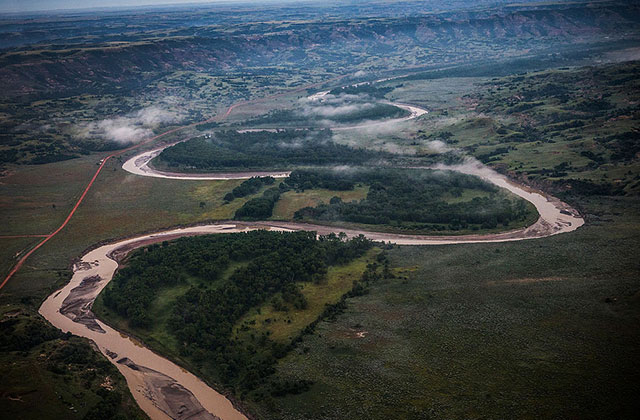Two days ago (July 26), Native tribes—including the Mandan, Hidatsa and Arikara Nation—received disappointing news: The Army Corps of Engineers approved permits to allow the 1,172-mile-long Dakota Access Pipeline to cross bodies of water near their communities.
This decision comes after months of protests from Native people concerned about the pipeline’s environmental and cultural impacts. Energy Transfer is the corporation behind the pipeline, which will transport about 450,000 barrels of crude oil a day from the fracked Bakken Shale Formation of North Dakota to Illinois.
"Another act of oppression by the government," said Lisa Deville of the Fort Berthold Reservation in a statement. "When the pipeline breaks, all of our water will be contaminated. Pipelines contain radioactive material that accumulates and becomes even more dangerous."
Two other groups, Bold Iowa and Iowa Citizens for Community Improvement, also opposed the construction out of concern that a leak would ruin farmland and rivers. Ten landowners filed a lawsuit—still traveling through state courts—alleging that the company legally use eminent domain to take their farmland, reported The Seattle Times.
The corps ignored the EPA, U.S. Department of Interior and the Advisory Council on Historic Preservation, all of which requested that the Corps conduct a formal Environmental Impact Assessment and issue an Environmental Impact Statement.
“We can now move forward with construction in all areas as quickly as possible in order to limit construction activities to one growing season and be in service by the end of this year,” said Lisa Dillinger, an Energy Transfer spokeswoman, to The Seattle Times.
Construction has already begun in North Dakota, South Dakota, Iowa and Illinois, so this didn’t exactly surprise anyone. The Indigenous Environmental Network responded with a statement:
“We are saddened to hear of this permit approval but knew the writing was on the wall. The Corps has a long history of going against the wishes and health of Tribal nations. This decision will not deter the resistance against the dirty Bakken pipeline. This decision merely highlights the necessity for the Corps of Engineers to overhaul the Nationwide Permit No. 12 process, which has been used by Big Oil to further place our lands, Indigenous rights, water and air at greater risk for disaster. We demand a revocation of this permit and advocate for the rejection of this pipeline.”
The Standing Rock Sioux Tribe in North and South Dakota launched a campaign earlier this year to fight the pipeline. “Rezpect Our Water” asserts that the pipeline “poses a serious threat to our water and our land.” The Missouri River crosses through their land. Now, the pipeline will too. The campaign centers Native youth and has received national attention from celebrities like Leonardo DiCaprio.
